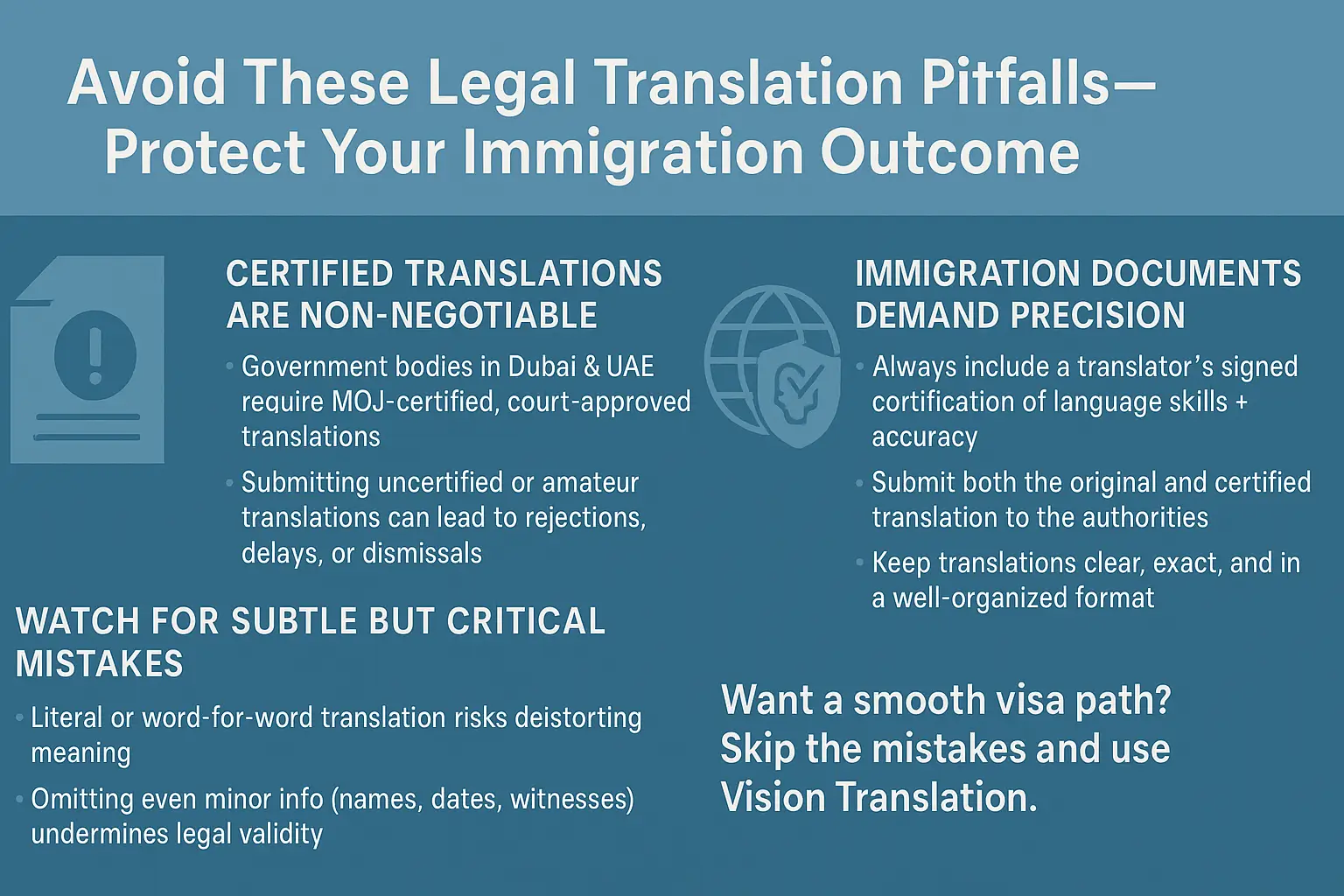
TL;DR: Legal translations in the UAE must be carried out by certified professionals who are officially recognised by the Ministry of Justice. Using uncertified translators or submitting inaccurate translations can result in serious consequences, including application rejections, lengthy delays, or even legal complications.
Key Takeaways:
Trying to handle your immigration documents on your own in the UAE might look like a way to save money, but it often ends up costing you more in the long run.
The country has very specific rules around legal translations, especially when it comes to immigration paperwork.
Just one small error, like a mistranslated term or a missing stamp, can lead to your application being delayed or flat-out rejected.
A job, school offer, or family reunion should be something to look forward to. But one small translation mistake can hold everything up.
Google Translate or a bilingual friend might seem fine, but legal documents need more than basic language skills.
You need someone who knows the legal system and how UAE immigration works.

Before your immigration application ever reaches approval, it passes through several layers of checks.
Translation errors are one of the most common reasons documents are delayed or denied. Here’s what UAE authorities typically expect:
There’s often confusion about these two terms. Here’s what you really need to know:
In the UAE, sworn translations are carried out by translators who have been officially authorised by the Ministry of Justice.
These translations are legally binding and are recognised by government departments, courts, and immigration authorities.
If you are preparing documents for a visa, residency application, or court proceedings, a sworn translation is not just helpful; in many cases, it is absolutely required.
A notarised translation is a little different. In this case, a notary public verifies the identity of the translator or confirms that the translation was done truthfully.
While notarisation adds a level of formality and may be enough for use outside the UAE (such as in embassy applications), it doesn’t carry legal weight locally.
Often, notarised documents still need to be re-translated or converted into sworn translations to be accepted by UAE government entities.
Poor legal translation doesn’t just affect immigration outcomes. It’s also causing serious issues in courtrooms across the UAE.
The breakdown of why legal translation in Dubai is failing many courtroom cases shows how these mistakes are impacting real people and real cases, and why qualified professionals matter.
The UAE has one of the strictest immigration systems when it comes to documentation.
Errors or incomplete translations don’t just cause delays.
In some cases, they can lead to serious setbacks like:
If you’re not sure where to begin when choosing a reliable service, explore this full list of professional translation services to understand what quality should look like.
Not all translation services are equal. If you’re shopping around, keep your eyes out for these warning signs:
If a translation service can’t show you clear proof that they’re licensed by the UAE Ministry of Justice, that’s a problem. Immigration offices won’t accept translations from just anyone.
No matter how polished the work looks, if it doesn’t come from an authorised translator, it could get rejected immediately.
Everyone wants a good deal, but when it comes to legal translation, super low prices are usually a red flag.
Quality work takes time, and certified translators have the skills and experience to get it right.
Cheap rates often mean shortcuts, rushed jobs, or someone translating without the proper legal knowledge.
There’s nothing wrong with working online, but immigration documents are serious business.
If a company can’t give you a proper address or phone number in the UAE, it’s worth being cautious.
You want to know you can reach them if there’s a problem or if something needs fixing.
Even the best translators can miss a detail now and then. That’s why any good agency should have a second expert look over the work before handing it back to you.
If there’s no mention of a review step, or if they rush through without double-checking, that’s a risk you shouldn’t take.

We know your immigration paperwork isn’t just paperwork. It represents your goals and next big step.
That’s why we treat every document seriously. At Vision Translation, we’re certified by the UAE Ministry of Justice and have spent over ten years helping people get their documents approved without setbacks.
Our translators don’t just speak the language. They understand the legal systems behind each document. We also know how important contract translation is for legal or business use.
This article on why accurate legal contract translation in Dubai is critical for your business covers the risks in more detail.
We’ve worked on these documents many times and know what it takes to get them approved.
If you’re planning to submit documents to UAE immigration, don’t risk doing it alone.
We’re based in Dubai and support clients across all Emirates.
Let us take care of the legal translation, so you can stay focused on what really matters; starting your new life in the UAE.
